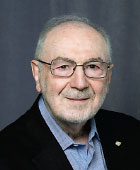My Journey Into Disaster Psychiatry: Join Me
Abstract
Like many psychiatrists, the author got involved with disaster-response work because of personal experiences. This article is part of a series by APA’s Committee on Psychiatric Dimensions of Disaster.

Many of you reading this have familiarity and indeed personal experience with disasters, such as tornadoes, floods, wildfires, hurricanes, and mass shootings. My life’s overwhelming disaster has been one that affects the lives of millions: war. Understanding disasters more broadly helps psychiatrists to provide care for those impacted by war.
My first encounter with disasters was being born in Budapest into the manmade carnage and destruction of World War II. An additional burden exposing our family to summary execution by murderous roving Nazi Arrow Cross gangs of thugs was that we belonged to the Jewish faith. After liberation from our hiding place by the Soviet Red Army fighting the retreating German Army, a Stalinist communist dictatorship held Hungary in its tyrannical iron grip. Growing up without freedom in a totalitarian police state added to the fear imposed by the always-threatening Cold War.
My liberation occurred upon escape to the freedom of neighboring Austria on December 15, 1956. It was past midnight, when cold and very tired after a forced 20 km march with my brother and parents, we crossed the temporarily open Iron Curtain into free Austria. But I felt happy: reborn at age 13. Our escape followed the brutal defeat of the popular Hungarian uprising by Soviet soldiers whose commanders lied that they were again fighting the resurgence of Nazism. How similar to the current Russian carnage inflicted on Ukraine!
Refugee life in Canada followed with its challenges, including learning a new language, resuming schooling, and of course, working part-time jobs, always. But nothing compared with hiding during WWII and living under a communist dictatorship, afraid for our lives.
I share these formative experiences of my life to illuminate the path that propelled me into medicine and then psychiatry with a strong focus on community and primary prevention, including school consulting and a military deployment in Afghanistan.
Further, my experience also helps to explain my interest and motivation to be helpful to people impacted by disasters. As psychiatrists, we are uniquely positioned to apply our knowledge and skills to help communities recover from disasters and enhance their resilience.
The APA Committee on Psychiatric Dimensions of Disaster provides a welcoming, expert home for this work. Many helpful resources for patients may be accessed on the APA webpage. The Disaster Psychiatry Section of the Canadian Psychiatric Association and the University of Toronto’s Disaster Psychiatry Canada website offer useful information for psychiatrists, including full recordings of our previous five CME training programs.
Information about our sixth annual CME course on June 9 may.
I’d like to close this brief introductory note by encouraging all colleagues in psychiatry, regardless of clinical or subspecialty interest, to consider yourself a “disaster psychiatrist” ready, willing, and able, with some self-directed training, to help out when disaster strikes your community. ■




